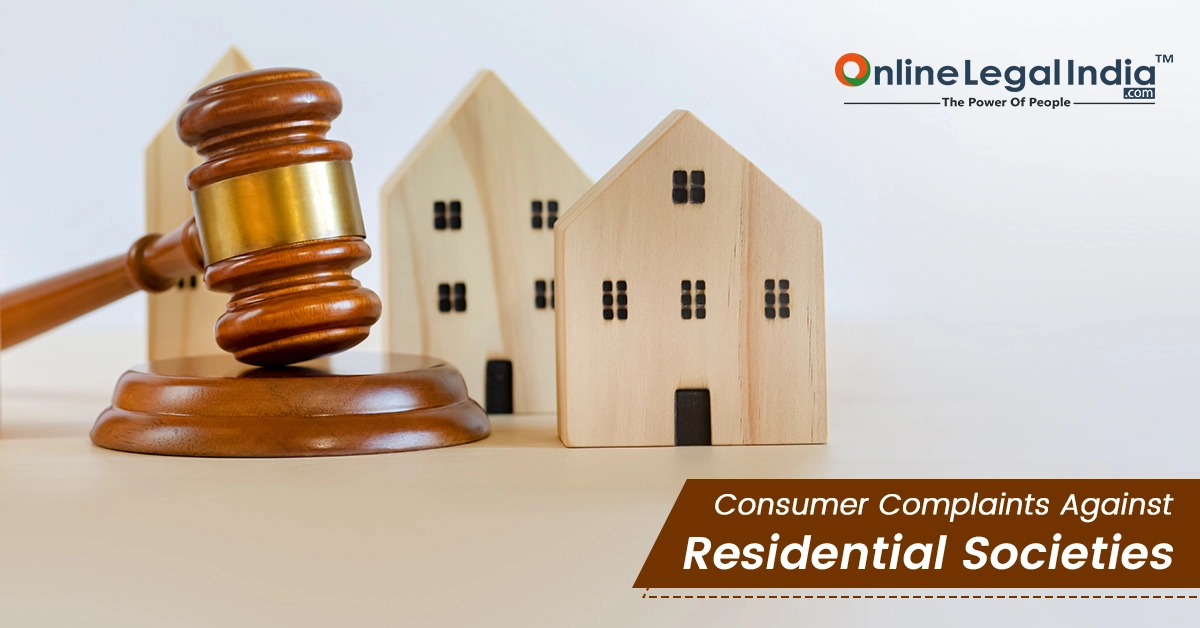Know the Cost to trademark a name and all the fees required
23 Apr, 2024

 By Online Legal India
Published On 13 Jan 2023
Category Consumer Complaint
By Online Legal India
Published On 13 Jan 2023
Category Consumer Complaint
Home purchasers in India have access to many sites where they may register complaints against developers in case of any misbehaviour or infraction. The most current specialised platform is RERA. Complaints can be filed in civil courts and consumer courts, among others. Consumer courts continue to witness a high volume of real estate disputes due to their widespread popularity, even though the RERA has gained favour among property purchasers seeking justice since it became fully operational in 2017. This blog discusses how to file an online consumer complaint against residential societies, the many issues that may develop for housing society members, and several avenues for redressal.
One can file a consumer complaint against residential societies on the following grounds:
The different types of Consumer Complaints in India are as follows-
If you work in a call centre, one of the most important call centres KPIs is the average time on wait (ATH). Customers want immediate replies and can't afford to be hooked to their phones for long periods of time. According to a study, customers are likely to hang up the phone after two minutes, and 34% will not call again. That implies that you risk losing a third of your consumer base if you don't answer the phone promptly.
When a product goes out of supply, it's usually a good indication, but if it's out of stock for an extended period of time, purchasers may become restless for it to return. They may request a specific order or ask questions about product modifications on a regular basis. This usually means that there is an urgent need for your items, which should be met.
Some consumers will not get along with your customer care employees, regardless of their tone, demeanour, or even the time of day. Some consumers believe that a rep's failure to fulfil their demands indicates that they are unconcerned about their situation. While this is occasionally true, there are instances when clients have higher expectations than your employees can meet. Whatever the problem, your company's reputation suffers when your salespeople aren't interested.
You can depend on your consumer to complain if your product fails. In other circumstances, the problem isn't with the product itself but with the customer's lack of understanding of how to utilise it. Customers may not always be suitable for your product or service, but they will hold your firm accountable if their requirements are unmet. Regardless of how they arrived at this judgement, your employees must understand how to keep clients from utilising your rivals' services.
Clients who call your customer care staff want the problem to be handled on the first call. According to data, if the service request is met on the first engagement, 67 per cent of customer turnover is averted. This is not to mention that you should keep clients on the phone all the time, but it does mean that they should try to solve problems on the first call.
Although it is not necessarily a complaint, customer service representatives deal with it regularly. For example, customers usually ask if they may recommend a new feature or product if your product or service does not totally meet all of their demands.
The Consumer Protection Act of 1986 covers consumer complaints, particularly concerning builders. You may file a lawsuit under this Act if you have an actual claim against the builder or seller. Depending on the reason, the desired remedy, and the gravity of the issue, there may be a statutory time for filing the case.
The procedure of filing a consumer complaint against residential societies involves the following steps-
Before filing a complaint with the consumer court, the developer and construction company must be notified (the opposing party). The notification should include the specific unfair practices employed by the developer to fulfil its contractual obligations to offer products and services to the complaint. It should also require payment within a certain time range. This may encourage the developer to compensate the complaint for the loss. However, if the developer refuses or ignores the notice, the case may be taken before the consumer court.
You must submit a formal complaint with the consumer court under the Consumer Protection Act of 1986. However, a lawyer is not required to submit such a complaint.
The fully filled complaint form must be given along with the required factual information, which should be written on a blank paper. In addition, the developer's and complainant's names must be stated.
After completing the form, you must pay a fee to file the complaint with the consumer court. Online transactions are also feasible. The District Consumer Disputes Redressal Forum will listen to complaints worth less than Rs 20 lakh.
The level of the jurisdiction of the Consumer Court is-
The District Consumer Disputes Redressal Forum will listen to the appeal if the claim is less than Rs. 20 lakhs.
If the claim is for more than Rs 20 lakh but less than Rs 1 crore, the matter will be heard by the State Consumer Dispute Redressal Commission. Individual purchasers can now approach the National Consumer Problems Redressal Commission (NCDRC) directly to address any disputes they may have with the real estate developer, owing to a landmark judgement by the Supreme Court of India. Before the ruling of the Hon'ble Supreme Court, the complainant may only bring their case before the NCDRC after first raising it with district or state officials. According to Section 23 of the Consumer Protection Act of 1986, the complaint has 30 days from the NCDRC's decision to file a legal challenge.
If the claim exceeds Rs 1 crore, the National Consumer Disputes Redressal Commission will handle the case.
West Bengal Co-operative Societies Rules, 2011 deals with the following provisions-
A written disagreement, known as a complaint, shall be submitted to the Registrar and should include the following information:
It should consist of the parties' names, descriptions, and addresses.
It should consist of a declaration about the dispute's topic and copies of relevant documents.
It should consist of the prayed-for alleviation and so forth.
(1) According to this Rule, to settle a disagreement, the board of Arbitrators or the arbitrator shall designate the date, time, and location of the hearing of the dispute, and they also have the authority to enable representation by an agent, guardian, or nearest friends.
(2) It is stated here that the Board of Arbitrators or the Arbitrator shall give notice or summons to the plaintiff and respondent at least 15 days before the hearing to allow them to gather relevant documents and evidence.
(3) The first and subsequent notices or summons may be served on a party to the dispute, his agent, or an adult family member.
(4) It is stated here that service of notice or summons on anybody, such as the Chairman, Secretary, or Chief Executive, and whatever their designation is, shall be considered service on the Co-operative.
(5) It is stated above that if a serving officer physically gives a copy of a summons or notice to an agent or other person on his behalf, he must get the signature of the person to whom the document is provided.
(6) It states that in all cases where the summon or notice is served, the serving officer shall endorse on the original summon or notice a return stating the time, date, and manner of service, as well as the name, signature, and address of the person identifying the person and witnessing the delivery.
(7) It indicates that the adequacy of the proof of service of the notice and summons shall be determined by the person who issued them.
(8) If the summons or notice is served on time and the plaintiff is absent on the hearing date, the case will be dismissed for default; if the defendant is missing, the case may be decided ex-parte; and if both parties are present, the case will proceed, and the defendant must submit a written statement along with copies of documents on the first date of hearing.
(9) It is also stated that each party can inspect the papers of the other party for authenticity and so on.
Rule 171: Award or determination
(1) According to this regulation, the board will decide after hearing both sides.
Co-operative Society Dissolution Order (Rule 177):
The dissolution of the Co-operative Society is addressed in this rule. When the Registrar issues an order for the dissolution of the Societies, he must announce it in the neighbourhood, notify the cooperative, and so on.
The preceding Rules describe how to report conflicts, file disputes, dispose of arguments, a mechanism for disposing of disputes, dissolve the Co-operative Society, and so on. So, any Residential Society member deprived of their rights or anything else can follow the abovementioned regulations to get an award or judgement.
Finally, the aggrieved party proceeds to the Consumer Forum if the issue is connected to a deficit in service or a fault in products. The Consumer Forum only deals with instances of a deficiency in favour or product defect. There are three commissions at various levels to address consumer issues: the District Commission, the State Commission, and the National Commission.
It is necessary to be acquainted with real estate laws and consumer protection laws if you do not wish to miss out on getting the compensation that you deserve. It is equally crucial that you hire the most competent lawyer that you can afford.

Know the Cost to trademark a name and all the fees required
23 Apr, 2024

How to Register a Brand Name
17 Apr, 2024

How Can You Download FSSAI Certificate?
15 Apr, 2024

Copyright a Business Name Know the Procedure
13 Apr, 2024

Top 10 Law Firms in India
11 Apr, 2024

Consumer Complaint against Tamil Nadu Electricity Board TNEB
30 Nov, 2020

How to Take Legal Action against Mental Harassment in India?
07 Nov, 2020

UPPCL Uttar Pradesh Power Corporation Ltd. Complaint Filing
19 Nov, 2020

How to File a Complaint Online in Consumer Court in India
27 Nov, 2020

Online Complaint Filing against Hero Motocorp
04 Dec, 2020